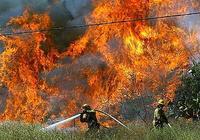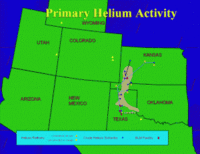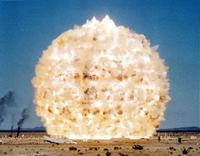-
N.C. university becomes first in state to offer homeland security degree
There are 380 security-related academic programs in U.S. colleges, most of which are two-year programs. Campbell University, established in 1887, has become the first university in North Carolina to offer a bachelor’s degree program in homeland security, beginning this fall. The school says the new degree is a direct result of a rising interest in the field.
-
-
Sponsors: Immigration bill addresses visa flaws highlighted by the Boston bombing
Lawmakers behind the bipartisan Senate immigration say bill directly addresses some of the security flaws that may have been exploited by the foreign student who helped Dzhokhar Tsarnaev dispose of evidence after the Boston Marathon bombings.
-
-
U.S. may acquire additional land for constructing border fence
A U.S. Customs and Border Protection (CBP) draft plan regarding the final sections of the border fence that separates the United States from Mexico could impact about 100 people, most reside in a nursing home, according to federal documents.
-
-
Schools do not offer students sufficient practical science experience

New evidence shows that a worrying number of students are not experiencing a complete and authentic education in the sciences, due to a lack of resources for practical work. Secondary schools reported not having enough of some of the most commonly used equipment, such as microscopes, eye protection, and connecting leads for circuits. The research also shows that many secondary schools lack essential support from qualified technicians to carry out practical work.
-
-
New technology prevents bridge collapse
Researchers propose a new technology that could divert vibrations away from load-bearing elements of bridges to avoid catastrophic collapses. The researchers propose a “wave bypass” technique that has many similarities to those being used by researchers looking to create Harry Potter-style invisibility cloaks, which exploit man-made materials known as metamaterials to bend light around objects.
-
-
Ash from olive residue biomass leads to more effective, cheaper concrete
Researchers have produced self-compacting concrete with ash from boiler combustion of olive pruning residue pellets. The plasticity and cohesion of this type of concrete mean no compaction is needed when used in construction and, moreover, it has other advantages with respect to conventional concrete.
-
-
NASA high school STEM challenge announces winning team
NASA science challenge asked students in grades 7–12 either to re-design a shield to keep Webb telescope cold enough to “detect infrared light from faint sources such as distant galaxies and extrasolar planets,” or to re-design a mirror assembly “so that Webb telescope may produce images that are “sufficiently bright and sharp to look back in time to when galaxies were young.”
-
-
California braces for out-of-control wildfires

The lack of precipitation over the past two winters has California and federal officials concerned about the impact wildfires could have in the summer months. California has already recorded 845 wildfires this year, a 60 percent increase compared with the average for the previous five years.
-
-
Seeking new ideas for mobile ad hoc networks (MANETs)
Troops operating in forward locations without telecommunication infrastructure often rely on a mobile ad hoc network (MANET) to communicate and share data. A constraint with current MANETs is they can only scale to around fifty nodes before network services become ineffective. DARPA is exploring new technologies unencumbered by Internet Protocols (IP) which could be the key to enabling large MANETs. The Internet facilitated far-reaching technical advances, but in this technology area the Internet may be the roadblock.
-
-
Draft of the 2013 U.S. National Climate Assessment is out
As mandated by the U.S. Global Change Research Act (GCRA), the U.S. Global Change Research Program (USGCRP) is currently producing a National Climate Assessment (NCA). The NCA is a report to inform the president, the Congress, and the American people about the current state of scientific knowledge regarding climate change effects on U.S. regions and key sectors, now and in the coming decades. The National Research Council (NRC) says that as the United States continues to engage with the threats, opportunities, and surprises of climate change in its many manifestations, the 2013 NCA should prove to be a valuable resource.
-
-
DHS chemical plant security program hobbled by problems, poor oversight
A DHS program responsible for the security of chemical facilities, such as the West Fertilizer Company plant in Texas, has been ineffective owing to a number of issues, leading federal investigators to wonder “whether it can achieve its mission, given the challenges the program continues to face.”
-
-
U.S. policy may lead to growing global shortage of helium

Helium is an essential resource in technologies such as medical imaging, rocket engines, and surveillance devices. In response to the element’s scarcity, the United States has been stockpiling helium since the 1960s in a National Helium Reserve called the Bush Dome, a deep underground reservoir outside of Amarillo, Texas. In 1996 the Helium Privatization Act mandated that the Department of the Interior sell off all the stockpiled helium by 2015. Scientists say that this action discourages the active exploration of helium since companies can buy it from the United States at a cheap price and sell it at a premium. The result will be a growing shortage of helium.
-
-
Smartphone app locates gunfire source

For the last decade, the Department of Defense has spent millions of dollars to develop sophisticated sniper location systems which are installed in military vehicles and require dedicated sensor arrays. Scientists have now developed a smartphone app that tracks gunfire and points in the direction the shot came from.
-
-
New fertilizer can be used to grow food – but not build bombs

Ammonium nitrate fertilizer is used in agriculture, but when mixed with a fuel such as diesel, it is highly explosive. It was used in about 65 percent of the 16,300 homemade IEDs in Afghanistan in 2012.About 1,900 troops were killed or wounded in IED attacks in 2012, 60 percent of American combat casualties. There have been more than 17,000 global IED incidents in 123 countries in the past two years. Timothy McVeigh used ammonium nitrate in Oklahoma City in 1995. Scientists have developed a fertilizer that helps plants grow but cannot detonate a bomb.
-
-
EPA slams State Department’s Keystone XL pipeline review
The Environmental Protection Agency (EPA) on Monday criticized the State Department’s environmental impact review of the Keystone XL pipeline, saying there was not enough evidence to back up key conclusions in the review on emissions, safety, and alternative routes. The EPA’s comments could have a negative effect on the approval of the project, but if the project is approved, the comments could serve as supporting evidence in any ligation against the pipeline.
-
More headlines
The long view
Encryption Breakthrough Lays Groundwork for Privacy-Preserving AI Models
In an era where data privacy concerns loom large, a new approach in artificial intelligence (AI) could reshape how sensitive information is processed. New AI framework enables secure neural network computation without sacrificing accuracy.
AI-Controlled Fighter Jets May Be Closer Than We Think — and Would Change the Face of Warfare
Could we be on the verge of an era where fighter jets take flight without pilots – and are controlled by artificial intelligence (AI)? US R Adm Michael Donnelly recently said that an upcoming combat jet could be the navy’s last one with a pilot in the cockpit.
The Potential Impact of Seabed Mining on Critical Mineral Supply Chains and Global Geopolitics
The potential emergence of a seabed mining industry has important ramifications for the diversification of critical mineral supply chains, revenues for developing nations with substantial terrestrial mining sectors, and global geopolitics.
AI and the Future of the U.S. Electric Grid
Despite its age, the U.S. electric grid remains one of the great workhorses of modern life. Whether it can maintain that performance over the next few years may determine how well the U.S. competes in an AI-driven world.
Using Liquid Air for Grid-Scale Energy Storage
New research finds liquid air energy storage could be the lowest-cost option for ensuring a continuous power supply on a future grid dominated by carbon-free but intermittent sources of electricity.
Enhanced Geothermal Systems: A Promising Source of Round-the-Clock Energy
With its capacity to provide 24/7 power, many are warming up to the prospect of geothermal energy. Scientists are currently working to advance human-made reservoirs in Earth’s deep subsurface to stimulate the activity that exists within natural geothermal systems.
